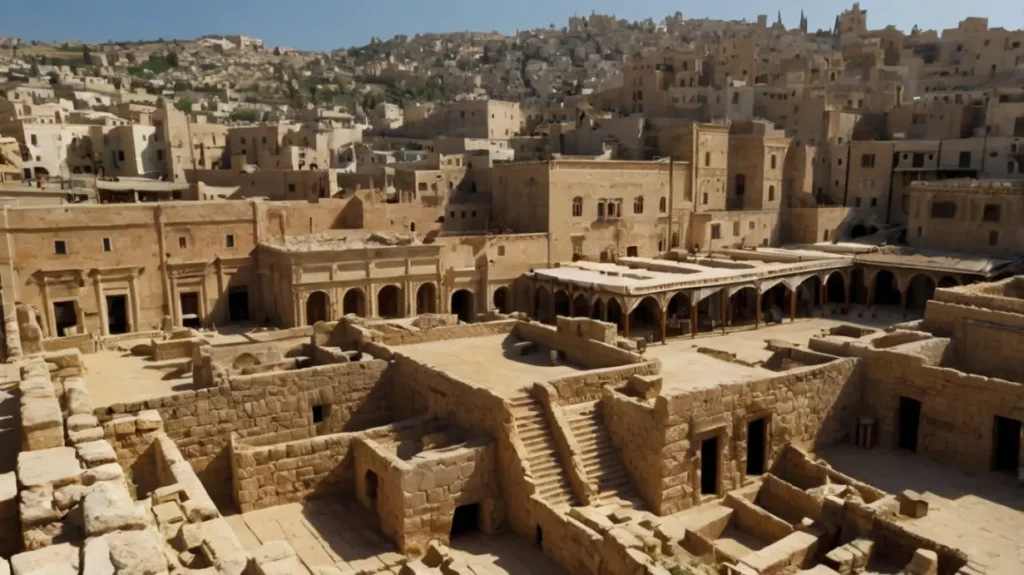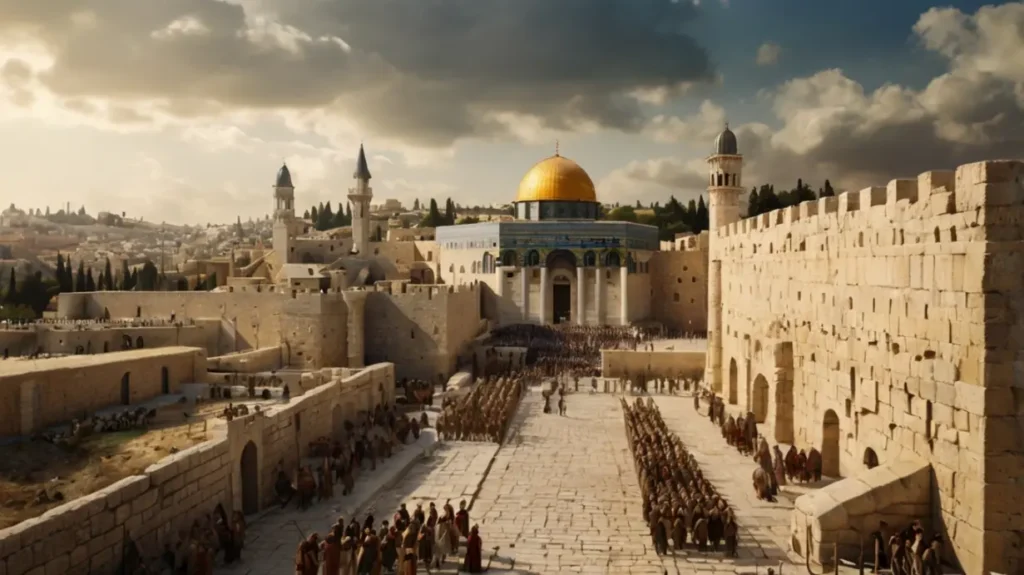Christmas is celebrated as the biggest festival in the world. It generates more money in a single year than what Muslims spend during ten years of Eid celebrations. But while billions of people across the globe celebrate it with lights, trees, and gifts — Muslims choose not to. Why is that? What does Islam say about Christmas, and why is it not part of Muslim tradition?
To understand this, we need to explore both the religious and historical background of Christmas and examine it from an Islamic perspective.
The Christian Belief Behind Christmas
For most Christians, Christmas marks the birth of Jesus Christ (known in Islam as Isa ibn Maryam عليه السلام). He is believed to have been born on the 25 th of December and this is the day that is celebrated as his birthday. This is not a universal belief, but, even among Christians.
The Islamic teachings state that Jesus (peace be upon him) was a mighty Prophet who was born miraculously to Maryam (Mary) but the Quran does not specify the date of his birth. Actually, even Christian scholars acknowledge that no one knows the exact date. Others even say that the date of December 25 was selected long after in history not due to any divine revelation but to make Christianity compatible with the earlier Roman pagan customs.
The Historical Context of Jesus’s Birth

The Historical Context of Jesus’s Birth
Jesus (peace be upon him) was born over 2,000 years ago in a small town in Palestine during the time of the Roman Empire. The ruler at the time was Caesar Augustus, one of the most powerful emperors of the Roman era. Interestingly, the month of August is named after him.
According to Islamic belief, Isa عليه السلام was born miraculously without a father, and from childhood, he displayed extraordinary signs. One such incident occurred when he disappeared while walking with his mother Maryam through the market. After searching for him, she found him sitting inside a Jewish temple debating with religious scholars. Even as a child, he challenged their corruption and misinterpretations of the divine message.
Why Muslims Don’t Celebrate Christmas
The Qur’an clarifies the story of Jesus’s birth in a way that differs significantly from Christian theology. While Muslims respect and honor Isa عليه السلام as a Prophet, they do not consider him the son of God or divine in any way. This is the central reason Muslims do not celebrate Christmas — because the celebration is based on beliefs that contradict the core tenets of Islamic monotheism (Tawheed).
Furthermore, the Qur’an mentions that when Maryam gave birth to Isa عليه السلام, she was sitting under a palm tree and was told to shake its trunk so fresh dates would fall for her to eat. This scene suggests a warm climate — most likely summer — not winter. This alone raises questions about the accuracy of December 25 as his actual birthday.
Jesus (Peace Be Upon Him) and His Miraculous Powers
As Jesus (Isa عليه السلام) grew older, he continued to display signs of divine favor and wisdom. According to Islamic tradition, Allah granted him miraculous powers. He could heal the sick, cure the blind, and even raise the dead — all by Allah’s permission. These miracles were not performed for fame or profit but to guide people toward monotheism and the worship of one God.
Jesus began openly preaching against the corrupt practices of the Jewish scholars of that time. He challenged their manipulation of religious texts and exposed how they took advantage of the poor, collecting charity for personal gain. In his sermons, he often called them “hypocrites” — a term that enraged the religious elite. As a result, these scholars began plotting to silence him.
The Role of the Roman Empire

At the time, Palestine was under Roman rule, and Caesar Augustus reigned as emperor. While the Jews lived in the region, they did not govern it. The Romans, being polytheists, worshipped multiple gods — including Jupiter and Saturn. As Jesus’s message gained followers, both Jewish scholars and Roman authorities began to see him as a threat.
The situation escalated when Jesus entered Jerusalem (Al-Quds). According to tradition, large crowds came out to greet him, laying palm branches in his path — a symbol of high respect. The Roman generals were astonished at his popularity and began fearing a rebellion. The Jewish religious leaders, already hostile toward him, found an opportunity. Together with Roman officials, they planned to eliminate him.
The Islamic View of the Crucifixion
The crucifixion is one of the most significant differences between the Christian and Islamic beliefs. According to Christianity, Jesus was crucified, died and resurrected on the third day. Islam, however, does not agree at all.
The Quran states that Jesus did not die on the cross. Allah instead lifted him to the heavens and it just seemed to people that he was killed. Someone else — possibly a traitor — was made to look like Jesus and was executed in his place. This belief is rooted in the following verse from the Qur’an:
“They did not kill him, nor did they crucify him — but it was made to appear so to them.” (Qur’an 4:157)
Therefore, Muslims believe that Jesus is still alive and will return to earth before the Day of Judgment to restore justice and defeat the false messiah (Dajjal).
The Rise of Christianity After Jesus
His close followers (who were thought to be 11 or 12) went on preaching the message of Jesus after he was taken to the heavens. First, they attempted to preach to the Jews, but they rejected them. Thus, they directed their activities to the non-Jewish world and Christianity started to expand.
Paul (Saint Paul) was one of the most influential people in this growth. Interestingly, Paul did not know Jesus in person. However, he turned out to be the most influential missionary of Christianity and brought many new ideas into the world, such as the notion that Jesus was not merely a Prophet but the Son of God and even divine.
The Transformation of Jesus’s Identity
Before Paul’s influence, early Christians viewed Jesus as a Prophet and servant of God. But, Paul introduced the belief that Jesus was the literal Son of God and part of a divine trinity — Father, Son, and Holy Spirit. This marked a drastic shift in theology. Over time, Paul’s version of Christianity became dominant in the Roman Empire, while the original followers of Jesus who believed in strict monotheism were marginalized and persecuted.
Another key transformation was the change of Jesus’s name and appearance. His Hebrew-Aramaic name “Isa” or “Yeshua” was adapted to the Greek “Iesous,” which later became “Jesus” in English. Moreover, Jesus, who was ethnically Middle Eastern, began to be depicted as a white European man in art and culture — a move meant to appeal to the Roman and European populations who were mostly white-skinned.
Christianity Adapts to Roman Culture
The expansion of Christianity in the Roman Empire did not come without compromise. The early Christian leaders started to borrow the aspects of Roman religion to make their new religion popular among the pagan population.
An example of this is the Christmas holiday on the 25th of December. This date was initially linked to Saturnalia, a Roman pagan festival in honor of the god Saturn. It entailed partying, exchange of presents, and sun worship at the winter solstice.
Since this festival was already popular in Rome, the church leaders chose to associate the birthday of Jesus with this festival not because it was historically accurate but to make Christianity more familiar and acceptable to the Roman people.
This ruling formed the basis of Christmas as we know it today a combination of Christian ideologies and Roman paganism.
The Pine Tree and the Festival Spirit
The use of the pine tree was another Roman tradition that was incorporated into Christmas. Most trees would die during cold winters in Europe, but the pine tree was evergreen and healthy. Roman people regarded it as a sign of immortality and spiritual power. They would also decorate branches of pine trees in their homes during Saturnalia.
In an effort to combine the two religions, early Christians kept the practice and gradually began to provide it with a Christian meaning. That is how the Christmas tree tradition originated, something that is not based on the teachings of Jesus or the Bible, but on pagan winter rituals.
Islam’s Position on These Innovations
Islam is very much against the mixing of divine guidance with cultural innovations or paganism. The Prophet Muhammad ﷺ cautioned against bidah (innovation in religion), particularly when such modifications corrupt the original message of monotheism.
Because the celebration of Christmas is based on a set of beliefs that are contrary to Islamic teachings, including the divinity of Jesus, the idea of Trinity, and the birth of Jesus on a date that was adapted by paganism, Muslims do not celebrate it.
Rather, Muslims respect Jesus by accepting that he was a prophet, that he was born miraculously, that he preached monotheism, and that he will come again as mentioned in the Quran and Hadith.
Harsh Persecution and the Story of the Sleepers of the Cave
Despite efforts to blend Christianity with Roman traditions, early Christians were not always accepted. In fact, there came a time when the Roman Empire, fearing the growing influence of Christianity, began persecuting its followers. Christians were tortured, imprisoned, and even executed for their beliefs.
One of the most powerful references to this persecution appears in the Qur’an in Surah Al-Kahf, which tells the story of the Sleepers of the Cave (Ashab al-Kahf). These were young believers who fled their homes to escape religious oppression and hid in a cave. Allah caused them to sleep for over 300 years, protecting them from harm. When they finally woke up, they found that the world had changed and their faith had become dominant.
This Qur’anic story mirrors the early Christian struggle under Roman rule and is an example of how Allah protects sincere believers during times of extreme trial.
Emperor Constantine and the Christian Roman Empire
A hundred and fifty years later, there was a radical change. Constantine the Great, the Roman Emperor, turned to Christianity. Christians were now legally safe and highly influential with the most powerful empire on their side. Christianity transformed itself into a religion of persecution to an official religion of the Roman Empire.
But the Constantine version of Christianity was not the same as what Jesus taught. During his era, the Roman paganism and Christianity were at their peak of fusion. He was instrumental in the standardization of Christian doctrine such as the divinity of Jesus and the birth of Jesus on December 25. This gave rise to the official recognition of Christmas as a religious holiday but it was not founded on divine mandate but rather politics and pagan influence.
The Evolution of Christmas: From Worship to Entertainment
Over the centuries that followed, Christmas gradually lost most of its religious content and turned into a cultural occasion. Although the holiday used to be celebrated by going to church and taking time to reflect spiritually, people started to introduce music, feasts, gifts, and, finally, commercialism.
Santa Claus was one of the greatest additions to the modern Christmas. Santa was originally depicted as a green or blue-robed bishop, who gave gifts to children, inspired by a real Christian bishop called Saint Nicholas, who was a generous man. However, in the early 20 th century, Coca-Cola started a campaign of adverts featuring Santa in red and white, the colors of the brand. This Santa became legendary and nowadays he is more popular than the original teachings of Jesus himself.
Christmas, which was a small religious event, has become a worldwide commercial event- even in non-Christian nations such as India and China. Christmas is the biggest economic event on earth with more than a trillion dollars being spent every year all over the world.
The Qur’anic Account of Jesus’s Birth
The Qur’an provides a very different picture of the birth of Isa عليه السلام (Jesus) than the one associated with Christmas. According to Surah Maryam, when Maryam (Mary) experienced labor pains, she withdrew to a remote place. There, under the shade of a date palm tree, Allah instructed her:
“And shake toward you the trunk of the palm tree; it will drop upon you ripe, fresh dates.” (Qur’an 19:25)
This detail indicates that it was not winter when the baby was born. Palm trees do not have ripe dates in December, least of all in the climate of Palestine. This also questions the historical correctness of December 25 as the real birthday of Jesus- even in a Biblical and scientific perspective. Actually, most Christian scholars concur that nobody knows when he was born.
Why Muslims Respect but Do Not Celebrate
Muslims accept Jesus as a great Prophet, who performed miracles, and who delivered the message of Allah. Still, they do not think that Jesus is God or the son of God. Islam is very strict in its observance of Tawheed, which is the oneness of God and does not allow the association of partners to Him.
Christmas celebration means acceptance of fundamental Christian doctrines like the Trinity and divinity of Christ which are in direct conflict with Islamic faith. This is why despite the fact that Muslims highly regard Isa عليه السلام and his mother Maryam, they do not celebrate Christmas, they do not give gifts, and they do not decorate their houses.
The Islamic Way to Honor Jesus (Peace Be Upon Him)
According to Islam, the only way to honor any Prophet is to believe in his/her actual message, obey his/her teachings, and practice the same values he/she believed in. Isa عليه السلام taught the truth, fairness, modesty, and the belief in a single God. Muslims express their love for him by:
- Believing in his miraculous birth
- Acknowledging his prophethood
- Refuting the false claims about his divinity
- Waiting for his second coming before the Day of Judgment
In fact, the Prophet Muhammad ﷺ said:
“There is no one among mankind who is closer to Jesus, son of Mary, than I am. The prophets are all brothers…” (Sahih al-Bukhari)
Conclusion: A Respectful Distance
Whereas Muslims exist in a world where Christmas is celebrated on a grand scale, Islam promotes the idea of keeping a respectful distance. We do not interfere with the rights of others to their religion but we do not engage in practices that are against our beliefs. The Christmas that is celebrated today is not just a cultural phenomenon but it is based on theological assertions that Islam cannot accept.
Therefore, Muslims do not recall Jesus as a divine figure but as a noble Prophet. They rejoice in his real message that is the message of monotheism, sincerity and submission to Allah only.
دنیا میں کرسمس سب سے بڑا تہوار سمجھا جاتا ہے۔ صرف ایک سال میں کرسمس سے اتنی آمدنی ہوتی ہے جتنی مسلمان دس سالوں کی عیدوں میں بھی خرچ نہیں کرتے۔ لیکن جہاں دنیا بھر میں اربوں لوگ اسے روشنیوں، درختوں اور تحفوں کے ساتھ مناتے ہیں — وہیں مسلمان اس میں شریک نہیں ہوتے۔ آخر ایسا کیوں ہے؟ اسلام کرسمس کے بارے میں کیا کہتا ہے، اور یہ مسلمانوں کی روایت کا حصہ کیوں نہیں ہے؟
اسے سمجھنے کے لیے ہمیں کرسمس کے مذہبی اور تاریخی پس منظر کا جائزہ لینا ہوگا، اور اسے اسلامی نقطۂ نظر سے دیکھنا ہوگا۔
کرسمس کے پیچھے عیسائی عقیدہ
زیادہ تر عیسائیوں کے لیے کرسمس حضرت عیسیٰ علیہ السلام (اسلام میں جنہیں عیسیٰ ابن مریم کہا جاتا ہے) کی پیدائش کی یادگار ہے۔ ان کا ماننا ہے کہ وہ 25 دسمبر کو پیدا ہوئے تھے اور اسی دن کو ان کی سالگرہ کے طور پر منایا جاتا ہے۔ لیکن یہ عقیدہ تمام عیسائیوں میں یکساں نہیں ہے۔
اسلامی تعلیمات کے مطابق حضرت عیسیٰ علیہ السلام اللہ کے جلیل القدر پیغمبر تھے، جو مریم علیہا السلام سے معجزانہ طور پر پیدا ہوئے، لیکن قرآن ان کی ولادت کی تاریخ کی کوئی وضاحت نہیں کرتا۔ درحقیقت، بہت سے عیسائی علما بھی اس بات کو تسلیم کرتے ہیں کہ کسی کو ان کی صحیح تاریخ پیدائش معلوم نہیں۔ بعض علما تو یہ بھی کہتے ہیں کہ 25 دسمبر کی تاریخ صدیوں بعد اس لیے منتخب کی گئی تاکہ عیسائیت کو رومن مشرکانہ رسم و رواج سے ہم آہنگ کیا جا سکے۔
حضرت عیسیٰ علیہ السلام کی پیدائش کا تاریخی تناظر
حضرت عیسیٰ علیہ السلام آج سے دو ہزار سال سے بھی پہلے فلسطین کے ایک چھوٹے سے شہر میں پیدا ہوئے، اُس وقت جب وہاں رومن سلطنت کی حکومت تھی۔ اس وقت کے حکمران کا نام قیصر آگسٹس تھا، جو رومن دور کا ایک طاقتور بادشاہ سمجھا جاتا ہے۔ دلچسپ بات یہ ہے کہ مہینے اگست کا نام بھی اسی کے نام پر رکھا گیا ہے۔
اسلامی عقیدے کے مطابق، حضرت عیسیٰ علیہ السلام بغیر والد کے معجزاتی طور پر پیدا ہوئے اور بچپن سے ہی غیر معمولی نشانیاں ظاہر کرتے تھے۔ ایک واقعہ میں وہ اپنی والدہ مریم کے ساتھ بازار میں چلتے ہوئے اچانک غائب ہو گئے۔ تلاش کے بعد مریم نے انہیں ایک یہودی عبادت گاہ میں پایا جہاں وہ اُس وقت کے علما سے مناظرے کر رہے تھے۔ وہ بچپن سے ہی اُن کی بدعنوانیوں اور الہامی پیغام کی غلط تشریح کو چیلنج کرتے تھے۔
مسلمان کرسمس کیوں نہیں مناتے
قرآن حضرت عیسیٰ علیہ السلام کی ولادت کی ایسی تفصیل بیان کرتا ہے جو عیسائی عقیدے سے کافی مختلف ہے۔ مسلمان حضرت عیسیٰ علیہ السلام کو ایک عظیم پیغمبر مانتے ہیں اور ان کا احترام کرتے ہیں، لیکن وہ انہیں خدا کا بیٹا یا خدائی درجہ نہیں دیتے۔ یہی بنیادی وجہ ہے کہ مسلمان کرسمس نہیں مناتے — کیونکہ یہ جشن ایسے عقائد پر مبنی ہے جو اسلامی توحید کے اصول سے متصادم ہیں۔
اس کے علاوہ، قرآن میں یہ بھی ذکر ہے کہ جب مریم نے حضرت عیسیٰ علیہ السلام کو جنم دیا تو وہ ایک کھجور کے درخت کے نیچے بیٹھی تھیں، اور انہیں حکم دیا گیا کہ وہ درخت کو ہلائیں تاکہ اس سے تازہ کھجوریں گریں جو وہ کھا سکیں۔ یہ منظر گرم موسم کی طرف اشارہ کرتا ہے — غالباً گرمیوں کا — نہ کہ سردیوں کا۔ صرف یہی بات 25 دسمبر کو حضرت عیسیٰ کی ولادت کا دن قرار دینے پر سوالیہ نشان لگا دیتی ہے۔
حضرت عیسیٰ علیہ السلام اور ان کے معجزات
جب حضرت عیسیٰ علیہ السلام بڑے ہوئے تو اُن میں اللہ کی خاص عنایات اور حکمت کے آثار نمایاں ہوتے گئے۔ اسلامی روایات کے مطابق، اللہ تعالیٰ نے انہیں مختلف معجزات عطا فرمائے۔ وہ بیماروں کو شفا دیتے، اندھوں کو بینائی لوٹاتے اور مردوں کو زندہ کر دیتے — یہ سب اللہ کے حکم سے ہوتا۔ ان معجزات کا مقصد شہرت یا دولت حاصل کرنا نہیں تھا، بلکہ لوگوں کو توحید کی طرف بلانا اور ایک اللہ کی عبادت کی طرف رہنمائی کرنا تھا۔
حضرت عیسیٰ علیہ السلام نے اپنے وقت کے یہودی علما کی بدعنوانیوں کے خلاف کھلم کھلا وعظ دینا شروع کیا۔ وہ ان علما کی تحریف شدہ تعلیمات پر تنقید کرتے اور ظاہر کرتے کہ یہ لوگ کس طرح غریبوں سے صدقات لے کر اپنے فائدے کے لیے استعمال کرتے ہیں۔ اپنے خطبوں میں وہ اکثر انہیں “منافق” کہا کرتے تھے — ایک ایسا لقب جس سے مذہبی طبقہ شدید ناراض ہو جاتا۔ نتیجتاً، ان علما نے حضرت عیسیٰ علیہ السلام کو خاموش کرانے کی سازشیں شروع کر دیں۔
رومن سلطنت کا کردار
اس وقت فلسطین رومن حکومت کے تحت تھا، اور قیصر آگسٹس رومن سلطنت کا بادشاہ تھا۔ اگرچہ فلسطین میں یہودی رہتے تھے، لیکن ان کی اپنی حکومت نہیں تھی۔ رومن مشرک تھے اور کئی خداؤں کی عبادت کرتے تھے — جن میں جیوپیٹر اور سیٹرن جیسے دیوتا شامل تھے۔ جب حضرت عیسیٰ علیہ السلام کی تعلیمات نے پیروکار حاصل کرنے شروع کیے تو یہودی علما اور رومن حکام دونوں نے انہیں ایک خطرہ سمجھنا شروع کر دیا۔
یہ صورتحال اس وقت شدت اختیار کر گئی جب حضرت عیسیٰ علیہ السلام نے یروشلم (القدس) میں داخلہ لیا۔ روایت کے مطابق، بڑی تعداد میں لوگ ان کے استقبال کے لیے نکلے اور ان کی راہ میں کھجور کی شاخیں بچھائیں — جو اس وقت عزت و احترام کی علامت تھی۔ رومن جنرلز ان کی مقبولیت دیکھ کر حیران رہ گئے اور انہیں بغاوت کا خدشہ ہونے لگا۔ یہودی مذہبی پیشوا، جو پہلے ہی حضرت عیسیٰ علیہ السلام سے دشمنی رکھتے تھے، نے رومن حکام کے ساتھ مل کر انہیں ختم کرنے کی سازش کی۔
صلیب کے بارے میں اسلامی نظریہ
عیسائیت اور اسلام کے درمیان ایک اہم عقائدی فرق حضرت عیسیٰ علیہ السلام کی صلیب سے متعلق ہے۔ عیسائی عقیدہ ہے کہ حضرت عیسیٰ کو صلیب دی گئی، وہ فوت ہو گئے، اور تین دن بعد دوبارہ زندہ ہوئے۔ لیکن اسلام اس نظریے کو مکمل طور پر رد کرتا ہے۔
قرآن کے مطابق، حضرت عیسیٰ علیہ السلام کو نہ تو قتل کیا گیا اور نہ ہی صلیب دی گئی، بلکہ اللہ تعالیٰ نے انہیں آسمانوں کی طرف اٹھا لیا، اور لوگوں کو صرف ایسا محسوس ہوا جیسے انہیں قتل کر دیا گیا ہو۔ ممکن ہے کہ کوئی اور شخص — جو شاید کوئی غدار ہو — ان کے مشابہ بنا دیا گیا اور اسے قتل کر دیا گیا۔ قرآن میں فرمایا گیا:
“اور انہوں نے نہ اسے قتل کیا اور نہ صلیب دی، بلکہ معاملہ ان کے لیے مشتبہ بنا دیا گیا۔” (سورۃ النساء: 157)
لہٰذا، مسلمانوں کا عقیدہ ہے کہ حضرت عیسیٰ علیہ السلام زندہ ہیں اور قیامت سے پہلے زمین پر دوبارہ آئیں گے تاکہ عدل و انصاف قائم کریں اور جھوٹے مسیح (دجال) کو شکست دیں۔
حضرت عیسیٰ علیہ السلام کے بعد عیسائیت کا پھیلاؤ
جب حضرت عیسیٰ علیہ السلام کو آسمانوں کی طرف اٹھا لیا گیا تو ان کے قریبی پیروکار (جن کی تعداد 11 یا 12 بیان کی جاتی ہے) نے ان کی تعلیمات کو پھیلانے کا کام جاری رکھا۔ ابتدا میں انہوں نے یہودیوں کو دعوت دی، لیکن ان کی طرف سے انکار کا سامنا ہوا۔ پھر وہ اپنی دعوت کو دیگر اقوام کی طرف لے کر گئے اور یوں عیسائیت پھیلنے لگی۔
اس پھیلاؤ میں سب سے نمایاں کردار پال (Saint Paul) کا تھا۔ دلچسپ بات یہ ہے کہ پال نے حضرت عیسیٰ علیہ السلام سے کبھی ملاقات نہیں کی، لیکن وہ عیسائیت کا سب سے بڑا مبلغ بن گیا۔ اس نے بہت سے نئے عقائد متعارف کروائے — جن میں یہ نظریہ بھی شامل تھا کہ حضرت عیسیٰ صرف نبی نہیں بلکہ اللہ کے بیٹے اور خود خدائی صفات والے تھے۔
حضرت عیسیٰ علیہ السلام کی شناخت میں تبدیلی
پال کی آمد سے پہلے، ابتدائی عیسائی حضرت عیسیٰ علیہ السلام کو اللہ کے نبی اور بندے کے طور پر مانتے تھے۔ لیکن پال نے یہ عقیدہ متعارف کروایا کہ حضرت عیسیٰ اللہ کے حقیقی بیٹے ہیں اور ایک خدائی تثلیث — باپ، بیٹا، اور روح القدس — کا حصہ ہیں۔ یہ نظریہ عیسائی عقائد میں ایک بہت بڑی تبدیلی کا آغاز تھا۔ وقت کے ساتھ پال کا نظریہ رومن سلطنت میں غالب آ گیا، جبکہ حضرت عیسیٰ کے اصل پیروکار، جو توحید پر یقین رکھتے تھے، حاشیے پر چلے گئے اور ان پر ظلم ہونے لگا۔
ایک اور بڑی تبدیلی حضرت عیسیٰ علیہ السلام کے نام اور ظاہری شکل میں کی گئی۔ ان کا اصل عبرانی-آرامی نام “عیسیٰ” یا “یشوع” تھا، جسے یونانی زبان میں “ایئسوس” بنایا گیا، اور پھر وقت کے ساتھ انگریزی میں “جیسس” ہو گیا۔ مزید یہ کہ، جو حضرت عیسیٰ نسلی طور پر مشرقِ وسطیٰ سے تعلق رکھتے تھے، انہیں مغربی مصوری اور فنون میں ایک سفید فام یورپی مرد کے طور پر پیش کیا جانے لگا — تاکہ یہ تصور رومن اور یورپی عوام کو زیادہ قابلِ قبول بن سکے۔
عیسائیت کا رومن ثقافت سے ہم آہنگ ہونا
رومن سلطنت میں عیسائیت کا پھیلاؤ سمجھوتوں کے بغیر نہیں ہوا۔ غیر عیسائی، مشرکانہ آبادی میں مقبول ہونے کے لیے، ابتدائی عیسائی راہنماؤں نے اپنے دین میں رومن مذہب کے کئی عناصر کو شامل کرنا شروع کر دیا۔
ایک نمایاں مثال 25 دسمبر کو کرسمس کا جشن منانا ہے۔ یہ تاریخ اصل میں سیٹرنلیا نامی ایک رومن مشرکانہ تہوار سے منسلک تھی، جو دیوتا سیٹرن کے اعزاز میں منایا جاتا تھا۔ اس موقع پر لوگ ضیافتیں کرتے، تحفے دیتے اور سردیوں کے سورج (ونٹر سولسٹس) کی پرستش کرتے۔ چونکہ یہ تہوار رومن سلطنت میں پہلے ہی سے مقبول تھا، اس لیے کلیسائی راہنماؤں نے حضرت عیسیٰ کی سالگرہ اسی دن پر رکھ دی — نہ کہ کسی الہامی بنیاد پر، بلکہ عیسائیت کو رومن شہریوں کے لیے زیادہ قابلِ قبول بنانے کے لیے۔
یہی وہ فیصلہ تھا جس نے آج کے کرسمس کی بنیاد رکھی — جو کہ عیسائی عقائد اور رومن مشرکانہ رسومات کا امتزاج ہے۔
کرسمس ٹری اور تہوار کی روح
کرسمس میں شامل ایک اور رومن رسم پائن کے درخت کا استعمال تھا۔ سرد یورپی موسم میں جب زیادہ تر درخت سوکھ جاتے ہیں، تب بھی پائن کا درخت ہرا بھرا اور مضبوط رہتا ہے۔ رومن اسے ہمیشگی اور روحانی طاقت کی علامت سمجھتے تھے۔ سیٹرنلیا کے موقع پر وہ پائن درخت کی شاخیں گھروں میں لا کر سجاتے تھے۔
ابتدائی عیسائیوں نے دونوں مذاہب کو جوڑنے کی کوشش کرتے ہوئے اس رسم کو باقی رکھا اور آہستہ آہستہ اسے عیسائی رنگ دے دیا۔ یوں کرسمس ٹری کی روایت شروع ہوئی — جو نہ حضرت عیسیٰ کی تعلیمات میں ہے اور نہ بائبل میں، بلکہ مشرکانہ سردیوں کے تہواروں کی بنیاد پر ہے۔
اسلام کا ان بدعات پر مؤقف
اسلام میں اللہ کی طرف سے نازل شدہ دین میں مشرکانہ رسومات یا ثقافتی ایجادات کو شامل کرنا سختی سے منع ہے۔ نبی کریم ﷺ نے بدعت سے خبردار کیا ہے، خاص طور پر وہ بدعات جو دینِ توحید کی اصل تعلیمات کو بگاڑ دیں۔ چونکہ کرسمس ایسے عقائد پر قائم ہے جو اسلامی تعلیمات سے متصادم ہیں — جیسے حضرت عیسیٰ کی خدائی، تثلیث کا نظریہ، اور ایک مشرکانہ تاریخ پر مبنی یومِ ولادت — اس لیے مسلمان اس تہوار میں شرکت نہیں کرتے۔
اس کے برعکس، مسلمان حضرت عیسیٰ علیہ السلام کو ان کے نبی ہونے، معجزاتی پیدائش، توحید کے پیغام، اور قیامت سے قبل واپسی پر ایمان لا کر ان کی عزت کرتے ہیں، جیسا کہ قرآن اور احادیث میں بیان ہوا ہے۔
ظلم و ستم اور اصحابِ کہف کی کہانی
اگرچہ عیسائیت کو رومن مذہب کے ساتھ ملانے کی کوشش کی گئی، پھر بھی ابتدائی عیسائیوں کو ہر جگہ قبول نہیں کیا گیا۔ ایک وقت ایسا بھی آیا جب رومن سلطنت نے عیسائیت کے بڑھتے ہوئے اثرورسوخ سے خوفزدہ ہو کر عیسائیوں پر سخت ظلم شروع کر دیا۔ انہیں قید کیا گیا، تشدد کا نشانہ بنایا گیا، اور حتیٰ کہ قتل بھی کیا گیا۔
قرآن میں اس ظلم کی ایک زبردست مثال سورۃ الکہف میں بیان کی گئی ہے، جہاں اصحابِ کہف کی کہانی بیان کی گئی ہے۔ یہ چند نوجوان مومن تھے جو اپنے ایمان کو بچانے کے لیے اپنے گھروں سے فرار ہو کر ایک غار میں چھپ گئے۔ اللہ تعالیٰ نے انہیں وہاں تین سو سال سے زیادہ سلا دیا اور ان کی حفاظت فرمائی۔ جب وہ بیدار ہوئے تو دیکھا کہ دنیا بدل چکی ہے اور ان کا دین غالب آ چکا ہے۔
یہ قرآنی قصہ ابتدائی عیسائیوں کی رومن حکومت کے تحت جدوجہد کی عکاسی کرتا ہے، اور یہ بتاتا ہے کہ اللہ کس طرح سچے مومنوں کی آزمائش کے وقت حفاظت فرماتا ہے۔
بادشاہ قسطنطین اور عیسائی رومن سلطنت
حضرت عیسیٰ علیہ السلام کے تین سو سال بعد ایک بڑا تاریخی موڑ آیا۔ رومن بادشاہ قسطنطین اعظم (Constantine the Great) نے عیسائیت قبول کر لی۔ جب دنیا کی سب سے بڑی سلطنت کا حکمران عیسائی بن گیا، تو عیسائیوں کو فوری طور پر قانونی تحفظ اور بے پناہ اثر و رسوخ حاصل ہو گیا۔ عیسائیت، جو کبھی ایک مظلوم اور ممنوعہ مذہب تھا، اب رومن سلطنت کا سرکاری مذہب بن گیا۔
لیکن قسطنطین کی اختیار کردہ عیسائیت وہ نہ تھی جو حضرت عیسیٰ علیہ السلام نے سکھائی تھی۔ قسطنطین کے دور میں رومن مشرکانہ عقائد اور عیسائیت کا امتزاج اپنی انتہا کو پہنچ گیا۔ اسی نے حضرت عیسیٰ کی خدائی کا نظریہ اور 25 دسمبر کو ان کی سالگرہ منانے جیسے عقائد کو “عیسائی عقائد” کی حیثیت سے رسمی طور پر تسلیم کرایا۔ یوں کرسمس کو ایک سرکاری مذہبی تعطیل کے طور پر رومن سلطنت میں منایا جانے لگا — لیکن یہ سب سیاسی مفادات اور مشرکانہ اثرات کی بنیاد پر تھا، نہ کہ کسی الہامی حکم پر۔
کرسمس کا ارتقاء: عبادت سے تفریح تک
اگلی صدیوں میں کرسمس نے آہستہ آہستہ اپنی مذہبی روح کھو دی اور ثقافتی اور تفریحی رنگ اختیار کر لیا۔ پہلے یہ دن کلیسا میں عبادت، دعا اور روحانی فکر کے طور پر منایا جاتا تھا، لیکن وقت کے ساتھ اس میں موسیقی، ضیافتیں، تحفے، اور پھر شدید تجارتی سرگرمیاں شامل ہو گئیں۔
جدید کرسمس میں سب سے اہم اضافہ سینٹا کلاز (Santa Claus) کا تھا۔ اس کردار کی بنیاد ایک حقیقی عیسائی راہب سینٹ نکولس (Saint Nicholas) پر ہے، جو اپنی سخاوت کے باعث مشہور تھے۔ ابتدائی طور پر سینٹا کلاز کو سبز یا نیلے لباس میں دکھایا جاتا تھا، جو بچوں کو تحفے دیتے تھے۔ لیکن 20ویں صدی کے آغاز میں کوکا کولا نے اپنے اشتہارات میں سینٹا کلاز کو سرخ اور سفید لباس میں پیش کیا — جو ان کے برانڈ کے رنگوں سے مطابقت رکھتا تھا۔ یہی انداز دنیا بھر میں مقبول ہوا، اور آج سینٹا کلاز حضرت عیسیٰ علیہ السلام کی اصل تعلیمات سے زیادہ مشہور ہو چکے ہیں۔
کرسمس، جو کبھی ایک چھوٹا مذہبی اجتماع تھا، اب ایک عالمی تجارتی تہوار بن چکا ہے — حتیٰ کہ ہندو اور کمیونسٹ ممالک جیسے بھارت اور چین میں بھی منایا جاتا ہے۔ ہر سال ایک ٹریلین ڈالر سے زیادہ کا خرچ صرف کرسمس سیزن میں ہوتا ہے، جو دنیا کا سب سے بڑا معاشی ایونٹ بن چکا ہے۔
قرآن میں حضرت عیسیٰ علیہ السلام کی ولادت کا ذکر
قرآن مجید میں حضرت عیسیٰ علیہ السلام کی پیدائش کا جو نقشہ پیش کیا گیا ہے، وہ کرسمس کے عقیدے سے بالکل مختلف ہے۔ سورۃ مریم کے مطابق، جب حضرت مریم علیہا السلام کو زچگی کی تکلیف ہوئی، تو وہ ایک سنسان جگہ کی طرف چلی گئیں۔ وہاں ایک کھجور کے درخت کے نیچے اللہ تعالیٰ نے انہیں فرمایا:
“اور کھجور کے تنے کو اپنی طرف ہلا، تاکہ اس سے تازہ کھجوریں تم پر گریں۔” (سورۃ مریم: 25)
یہ منظر کسی گرم موسم کی عکاسی کرتا ہے — نہ کہ سردیوں کی۔ کیونکہ فلسطین میں دسمبر میں کھجور کے درخت پھل نہیں دیتے۔ یہ بات خود سائنسی اور بائبل کی بنیادوں پر بھی ثابت ہوتی ہے کہ حضرت عیسیٰ کی پیدائش کی اصل تاریخ دسمبر 25 نہیں ہو سکتی۔ خود بہت سے عیسائی علما اس بات کو مانتے ہیں کہ حضرت عیسیٰ کی پیدائش کی درست تاریخ کسی کو معلوم نہیں۔
مسلمان حضرت عیسیٰ سے محبت کرتے ہیں، لیکن کرسمس نہیں مناتے
مسلمان حضرت عیسیٰ علیہ السلام کو اللہ کے عظیم پیغمبر کے طور پر مانتے ہیں۔ ان کے معجزاتی طور پر بغیر باپ کے پیدا ہونے پر یقین رکھتے ہیں۔ ان کے معجزات، تعلیمات اور توحید کے پیغام پر ایمان رکھتے ہیں۔ لیکن وہ یہ نہیں مانتے کہ حضرت عیسیٰ اللہ کے بیٹے یا خدائی صفات والے تھے۔
کرسمس منانا، اسلامی نقطہ نظر سے، ان عقائد کی تائید کے مترادف ہوتا ہے — جیسے تثلیث (Trinity)، خدائی (Divinity)، اور جھوٹی تاریخِ ولادت — جو توحید کے اصول کے خلاف ہیں۔ یہی وجہ ہے کہ مسلمان، باوجود اس کے کہ حضرت عیسیٰ اور حضرت مریم علیہما السلام سے گہری عقیدت رکھتے ہیں، کرسمس میں شرکت نہیں کرتے، تحفے نہیں دیتے، اور نہ ہی سجاوٹ کرتے ہیں۔
حضرت عیسیٰ علیہ السلام کو اسلامی انداز میں خراجِ عقیدت
اسلام یہ سکھاتا ہے کہ کسی بھی نبی کو حقیقی عزت دینا اُس وقت ممکن ہے جب اُس کے اصل پیغام پر ایمان لایا جائے، اُس کی تعلیمات پر عمل کیا جائے، اور وہی اقدار اپنائی جائیں جن کا وہ علمبردار تھا۔ حضرت عیسیٰ علیہ السلام نے اخلاص، عدل، انکساری، اور ایک اللہ کی عبادت کا پیغام دیا۔
مسلمان ان سے اپنی محبت یوں ظاہر کرتے ہیں کہ:
-
ان کی معجزاتی پیدائش پر ایمان رکھتے ہیں
-
ان کے نبی ہونے کو تسلیم کرتے ہیں
-
ان کی خدائی سے متعلق جھوٹے دعووں کو رد کرتے ہیں
-
اور ان کی قیامت سے قبل واپسی کا انتظار کرتے ہیں
نبی کریم ﷺ نے فرمایا:
“آدم کی اولاد میں کوئی شخص حضرت عیسیٰ ابن مریم سے میرے زیادہ قریب نہیں۔ انبیاء علیہم السلام سب آپس میں بھائی ہیں…” (صحیح بخاری)
نتیجہ: ایک باادب فاصلہ
اگرچہ مسلمان ایک ایسی دنیا میں رہتے ہیں جہاں کرسمس بڑے پیمانے پر منایا جاتا ہے، اسلام انہیں سکھاتا ہے کہ دوسروں کے عقیدے کا احترام کرتے ہوئے ایسے عقائد اور روایات سے فاصلہ رکھا جائے جو اسلامی تعلیمات سے متصادم ہوں۔ آج کا کرسمس صرف ایک ثقافتی تقریب نہیں، بلکہ ایسے عقائد پر مبنی مذہبی دعوؤں سے جڑا ہوا ہے جنہیں اسلام قبول نہیں کرتا۔
اسی لیے مسلمان حضرت عیسیٰ علیہ السلام کو ایک جلیل القدر نبی کے طور پر یاد رکھتے ہیں، نہ کہ خدائی صفات والے کے طور پر۔ وہ ان کے اصل پیغام — یعنی توحید، اخلاص، اور اللہ کے سامنے مکمل اطاعت — کو مانتے اور اسے اپناتے ہیں۔










